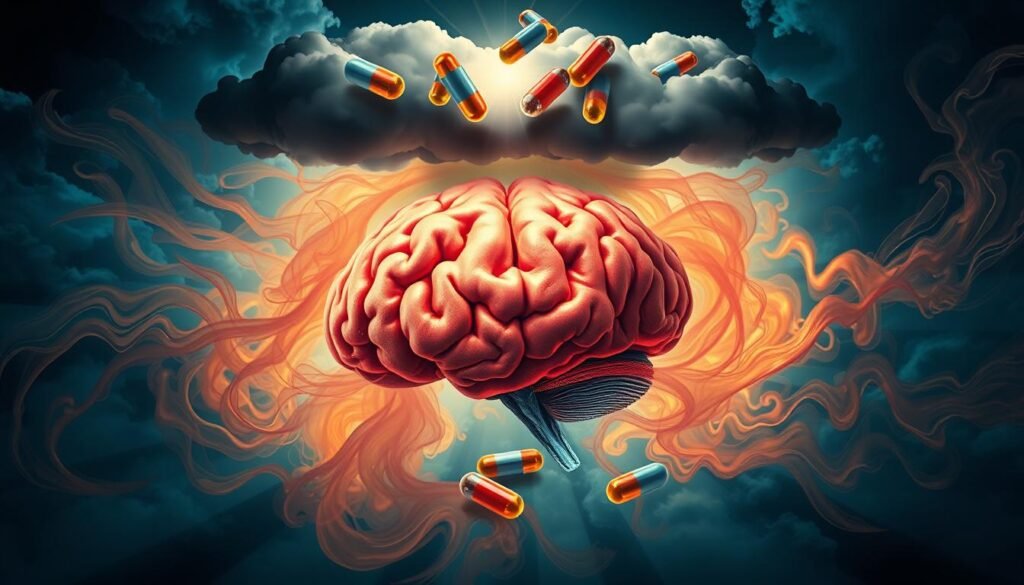Up to 40% of people might have very low levels of vitamin B12, which is crucial for mental health. Anxiety and stress are increasing, affecting one in six Americans as of 2019. This has led to a question: can B12 help with anxiety?
Vitamin B12 is key for brain health and nerve function. The idea of B12 for anxiety relief is getting attention, especially for those with mood disorders. This is based on science and personal stories that show its impact on anxiety.
Want to know how B12 can lessen anxiety? Keep reading for the latest studies and stories supporting B12 for mental wellness. For a deeper look into B12 and anxiety, check out this informative blog post.
Key Takeaways
- 40% of the population may have critically low vitamin B12 levels.
- Vitamin B12 deficiency has been linked to anxiety symptoms.
- Over 50% of individuals with anxiety or depression exhibit low B12 levels.
- The MTHFR gene mutation affects B-complex vitamin absorption in many individuals.
- Research suggests mixed outcomes for B vitamins in relation to anxiety relief.
- B12 supplementation may serve as a beneficial adjunct in managing anxiety.
- Understanding the dietary sources of vitamin B12 is essential for maintaining adequate levels.
The Role of Vitamin B12 in Mental Health
Vitamin B12 is vital for good mental health. It helps the brain and nerves work right. It makes important brain chemicals that affect mood and thinking. Studies show B12 can help people feel less depressed.
B12 is also key in fighting anxiety. Not having enough can lead to tiredness, sadness, and trouble thinking. People with anxiety could feel a lot better by getting more B12. They might feel happier and more energetic.
Not having enough B12 can cause problems. These can include feeling confused, having trouble walking, and feeling tingles. A low B12 level can mess with your brain.
Here are some important points about B12 and mental health:
- Over 264 million people worldwide have depression, and many also have anxiety.
- Higher levels of B12 can lower the risk of brain problems. This is especially true for older people.
- Taking B12 and folate can help people with depression think clearer.
Want to know more about B12 and feeling happy? Check out this info on B12 and depression. It’s got great tips for boosting mental health.
Understanding Anxiety Disorders
About 40 million adults in the United States suffer from anxiety disorders. This is nearly 18% of the adult population. Conditions like Generalized Anxiety Disorder (GAD), panic disorder, and social anxiety disorder are included. GAD, the most common mental health issue in the U.S., affects more than 19% of people at some point. Young people report increasing cases of GAD, showing a need for good anxiety treatments.
Managing anxiety disorders requires understanding psychological and biochemical factors. Recent studies show that lifestyle changes can greatly lower anxiety levels. This includes regular exercise, enough sleep, and a balanced diet. Adhering to certain dietary patterns can help prevent and treat anxiety. There are many anxiety treatments. They go beyond medication to include natural remedies, mindfulness, and cognitive therapy.
Many wonder: does B12 help with anxiety? Recent studies stress the role of nutrients like B12 in mental health. They may help increase resistance to anxiety disorders. When looking for treatments, remember the value of lifestyle changes and nutritional support. Sometimes, professional help is needed too.

How B12 Affects Anxiety
Vitamin B12 and anxiety have a strong link. Studies show that enough B12 can help manage mood and feelings. This vitamin plays a key role in making neurotransmitters, like serotonin and GABA. They help control mood, which shows B12’s vital role in dealing with anxiety.
Not having enough B12 can make anxiety worse. It can lead to mood changes and anxiety symptoms. Researchers found that people with anxiety and depression often lack key vitamins, including B12. Looking into how vitamin B12 and anxiety are connected reveals how crucial B12 is in reducing anxiety.
Low levels of B12 are common in those with anxiety and depression. They often don’t get enough B vitamins. Using supplements to fix these shortages can help mental health. In particular, getting enough B12 can make managing anxiety easier.
We need more studies to fully understand how B12 affects mood disorders. Yet, it’s clear that people who might not get enough B12 should check their diet. Getting enough B12 could be key to lessening anxiety and improving emotional well-being.
| Vitamin | Potential Impact | Deficiency Effects |
|---|---|---|
| Vitamin B12 | Supports neurotransmitter production | Mood disorders, increased anxiety |
| Vitamin B6 | Helps regulate GABA levels | Elevated anxiety, depressive symptoms |
| Folic Acid | May enhance B12 effectiveness | Poor mood, anxiety symptoms |
Learning about B12 and its influence on anxiety can help people choose better nutrition. This can lead to improved mental health.
Does B12 Help with Anxiety: What the Research Shows
Studies have looked into vitamin B12 and its link to anxiety, finding some interesting results. A 2017 study discovered that having less B12 in your blood could make you more likely to feel anxious or depressed. This led to questions about B12’s effect on anxiety.
Overview of Recent Studies
More research has been done on b12 benefits for anxiety and how it fits in with other B vitamins. In 2018, a study found that people eating B12-rich spreads like Marmite and Vegemite felt less anxious and stressed. Then, a 2019 study showed that a supplement with B vitamins, vitamin C, calcium, magnesium, and zinc helped lower anxiety in young adults.
Comparison with Other B Vitamins
Vitamin B12’s role in easing anxiety differs from the effects of other B vitamins. A 2019 analysis revealed that B vitamins decrease stress but don’t directly lower anxiety. This indicates that, although B vitamins are good for mental health in general, their benefits can vary. Even with magnesium and lemon balm showing promise against anxiety, B12 stands out in mental health maintenance.
| Study Year | Finding | Focus |
|---|---|---|
| 2017 | Lower B12 levels linked to higher anxiety rates | B12 |
| 2019 | B vitamins reduced anxiety significantly in young adults | B Vitamin Complex |
| 2018 | Fortified B12 spreads improved anxiety scores | B12 in Diet |
| 2019 | B vitamins shown to reduce stress without improving anxiety | Comparison with other B vitamins |

B12 Deficiency and Its Connection to Anxiety
It’s critical to understand how B12 deficiency links to anxiety for better mental health. People lacking B12 often feel more anxious. This connection shows why it’s vital to consider nutrition in our mental health plans.
Symptoms of B12 Deficiency
Early detection of symptoms of B12 deficiency is key. Symptoms include:
- Fatigue
- Pale or yellow skin
- Headaches
- Depressive symptoms
- Gastrointestinal issues
- Difficulty concentrating
- Mental impairment
- Paresthesia (pins and needles sensation)
- Glossitis (inflamed, painful tongue)
These conditions can lead to increased b12 deficiency anxiety. This is especially true for those ignoring the dietary reasons behind their mental health issues.
Who Is at Risk for Deficiency?
Some groups are more likely to face vitamin B12 shortages. Risk factors for who is at risk for B12 deficiency include:
- Individuals over the age of 50 due to reduced stomach acid production
- People following vegetarian or vegan diets, since B12 is primarily found in animal products
- Those who have had weight loss surgery, affecting nutrient absorption
- Individuals taking heartburn medications that lessen stomach acid
- Patients with digestive disorders such as Crohn’s disease or celiac disease
Knowing the risks helps. Diet changes and perhaps supplements may be required. This ensures good B12 levels and aids mental health.

| Group at Risk | Reason | Symptoms to Watch |
|---|---|---|
| Older Adults | Decreased stomach acid production | Fatigue, cognitive decline |
| Vegetarians/Vegans | Lack of animal product intake | Pale skin, gastrointestinal issues |
| Post-Surgery Patients | Impaired absorption | Muscle cramps, weakness |
| Heartburn Medication Users | Reduced stomach acid | Headaches, depressive symptoms |
| Digestive Disorder Patients | Malabsorption of nutrients | Mental impairment, anxiety |
B12 Benefits for Anxiety
Vitamin B12 is key for mental health, serving as a vital aid for those with anxiety. It is sought after for mood stabilization and enhancing well-being. The beneficial impact of B12 supplementation shows its strong connection to mental health improvements.
Research highlights the importance of B12 for brain and nervous system function. With enough B12, you might feel more energetic. This can improve your mood and how your brain works, affecting anxiety levels.
Studies show that B12 supplements can make a small difference in anxiety. This effect may not be as big as with vitamin B6, but B12’s role is still crucial. It partners with other vitamins to boost mental health.
- B12 and the calming neurotransmitter GABA are connected, showing how B12 can help manage anxiety.
- Taking B12 daily is good for those who might not get enough, as low levels can make anxiety worse.
- Some people say their mood and anxiety improved after they started taking B12 supplements.
Pursuing B12 for anxiety is a hopeful path for better mental health and easing anxiety. It can complement a treatment plan for those with anxiety disorders. Proper B12 use could lead to a more balanced, happier life.
How to Incorporate B12 Supplements Effectively
Adding B12 supplements to your daily life can boost your mental health and ease anxiety. It’s key to know the different forms and stick to the recommended dosages of B12 for the best effects. People can choose from sublingual tablets, injections, or foods rich in B12 to get enough of it.
Recommended Dosages and Forms
The recommended dosages of B12 change based on your age, health, and what you eat. Here’s how much you need every day:
| Age Group | Recommended Dosage (mcg) |
|---|---|
| Adults (19-64 years) | 2.4 |
| Adults (65 years and older) | 2.4 – 100 |
| Pregnant Women | 2.6 |
| Breastfeeding Women | 2.8 |
B12 comes in various forms, each with its own benefits. Sublingual tablets go under the tongue for better absorption. Injections work best for those who have trouble absorbing it from food. And for food lovers, fortified cereals and dairy are great best B12 sources for anxiety relief.
Before starting any supplement, it’s wise to talk to a doctor, especially if you have health issues. This way, you get advice that fits your health needs. Experts agree that getting enough B12 can improve both mood and brain power. For more details, check out this resource.
Best B12 Sources for Anxiety Relief
Getting enough vitamin B12 is key for mental health, especially for those dealing with anxiety. This nutrient is needed to make red blood cells and keep the nervous system healthy. Learning about the top B12 sources can help people add this vital nutrient to their meals. This supports their mental health.
Dietary Sources of Vitamin B12
There are many foods rich in vitamin B12 that can boost overall health and lift your mood. Let’s explore some top food sources of vitamin B12:
- Lamb Liver: With only 3.5 ounces (100 grams), lamb liver gives a whopping 3,571% of the Daily Value (DV) for vitamin B12.
- Clams: Eating just 20 small clams (190 grams) can provide more than 7,000% of the DV for B12.
- Sardines: A 1-cup (150-gram) serving of drained sardines offers 554% of the DV for vitamin B12.
- Flat Iron Steak: One cooked piece (about 190 grams) comes with 467% of the DV.
- Canned Tuna: A single can (165 grams) of light tuna in water has 152% of the DV.
- Salmon: A half fillet (178 grams) of cooked salmon gives 208% of the DV for B12.
- Nutritional Yeast: Just two tablespoons (15 grams) can pack up to 733% of the DV.
- Fortified Cereals: Options like Malt-O-Meal Raisin Bran offer up to 62% of the DV per cup (59 grams).
- Eggs: Two large eggs (100 grams) provide about 46% of the DV for vitamin B12.
- Swiss Cheese: A large slice (22 grams) gives around 28% of the DV.
- Soy Milk: One cup (240 ml) can deliver up to 86% of the DV.
- Trout: A 3.5-ounce (100-gram) serving of trout offers about 312% of the DV.
Adding these B12-rich foods to your daily diet can help keep your B12 levels up. This can lead to less anxiety and better mental health. Adequate B12 intake improves brain functions and emotional health. This may even lower anxiety signs.
Alternative Treatments for Anxiety and Mental Well-Being
Anxiety is a common issue, with about 31% of adults experiencing it. Looking for effective, alternative anxiety treatments is key for many. These holistic methods can enhance mental health alongside traditional treatments.
Herbal remedies like chamomile can be beneficial. For example, taking three 500mg capsules each day for a few months can help a lot. L-theanine can also reduce anxiety in stressful times, with 200-400mg being effective.
- Acupuncture has been effective in reducing anxiety symptoms, especially within the first six weeks.
- Omega-3 supplements can greatly reduce anxiety symptoms.
- Positive affect journaling can lessen anxiety symptoms over time and is simple to do daily.
- Magnesium can help with mild anxiety symptoms.
- Lemon balm can relieve anxiety, particularly after major medical procedures.
Adding vitamin B12 supplements might boost these treatments for mental wellness. Low B12 levels often link to anxiety. Using these alternatives with B12 can better mental health.
Before trying any alternative treatments, talk with a healthcare provider. They’ll ensure the treatments are safe and right for you. Find out more about vitamins and mental health here.
Conclusion
The role of vitamin B12 in mental health and easing anxiety is getting more focus. Stress and anxiety have risen sharply in recent years. Before the pandemic, one in six Americans felt anxious. During it, more than a third did. Now, it’s vital to understand how B12 can help ease anxiety.
Studies show a strong link between low B12 levels and anxiety, especially in people under 60. Many in this age group may not realize they’re low in B12. While a 2019 study suggests B vitamins reduce stress, we can’t say B12 alone fights anxiety. Yet, adding B12 to your wellness plan might help with anxiety.
Those struggling with anxiety should think about using B12 supplements. This is just part of supporting your mental health. A good diet, therapy, and advice from doctors are important too. Together, they offer a full strategy to manage anxiety.
If you think you lack B12, talk to your doctor. A blood test can tell if you need more, especially if you’re older or don’t eat animal products. As we learn more about how B12 helps with anxiety, those needing help can find new ways to improve their mental health.